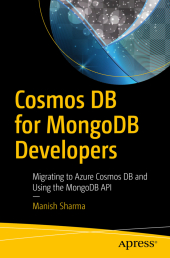 Neuerscheinungen 2018Stand: 2020-02-01 |
Schnellsuche
ISBN/Stichwort/Autor
|
Herderstraße 10
10625 Berlin
Tel.: 030 315 714 16
Fax 030 315 714 14
info@buchspektrum.de |

Manish Sharma
Cosmos DB for MongoDB Developers
Migrating to Azure Cosmos DB and Using the MongoDB API
1st ed. 2018. xviii, 209 S. 118 SW-Abb. 235 mm
Verlag/Jahr: SPRINGER, BERLIN; APRESS 2018
ISBN: 1-484-23681-5 (1484236815)
Neue ISBN: 978-1-484-23681-9 (9781484236819)
Preis und Lieferzeit: Bitte klicken
Learn Azure Cosmos DB and its MongoDB API with hands-on samples and advanced features such as the multi-homing API, geo-replication, custom indexing, TTL, request units (RU), consistency levels, partitioning, and much more. Each chapter explains Azure Cosmos DB´s features and functionalities by comparing it to MongoDB with coding samples.
Cosmos DB for MongoDB Developers starts with an overview of NoSQL and Azure Cosmos DB and moves on to demonstrate the difference between geo-replication of Azure Cosmos DB compared to MongoDB. Along the way you´ll cover subjects including indexing, partitioning, consistency, and sizing, all of which will help you understand the concepts of read units and how this calculation is derived from an existing MongoDB´s usage.
The next part of the book shows you the process and strategies for migrating to Azure Cosmos DB. You will learn the day-to-day scenarios of using Azure Cosmos DB, its sizing strategies, and optimizing techniques for the MongoDB API. This information will help you when planning to migrate from MongoDB or if you would like to compare MongoDB to the Azure Cosmos DB MongoDB API before considering the switch.
What You Will Learn
Migrate to MongoDB and understand its strategies
Develop a sample application using MongoDB´s client driver
Make use of sizing best practices and performance optimization scenarios
Optimize MongoDB´s partition mechanism and indexing
Who This Book Is For
MongoDB developers who wish to learn Azure Cosmos DB. It specifically caters to a technical audience, working on MongoDB.
Chapter 1: Why NoSQL?
Chapter Goal: To set the context for the NoSQL
No of pages: 5 - 8
Sub -Topics
1. Existence of NoSQL databases
2. Types of NoSQL databases & their usage
3. Expectation from NoSQL databases
4. Future of NoSQL on cloud
Chapter 2: CosmosDB overview
Chapter Goal: Provide overview of CosmosDB
No of pages : 20 - 25
Sub - Topics
1. Global distribution
2. Multi Modal API
3. Elastic scale
4. Consistency
5. Performance
6. SLA
Chapter 3: CosmosDB Multi-geo replication
Chapter Goal: Help reader to provide an understanding the difference between geo replication of CosmosDB as compared to MongoDB
No of pages : 10 - 15
Sub - Topics:
1. Configuration
2. Auto-shift Geo APIs
3. Multi-read / single write region pattern
4. Atomicity & Geo-replication
Chapter 4: Indexing
Chapter Goal: Help reader to understand indexing behavior of CosmosDB compare to MongoDB
No of pages : 15 - 20
Sub - Topics:
1. Auto Indexing
2. Custom Indexing
3. Indexing methods
4. Optimizations
Chapter 5: Partitioning
Chapter Goal: Help reader to understand partitioning behavior of CosmosDB compare to MongoDB
No of pages : 15 - 20
Sub - Topics:
1. MongoDB Partitioning
2. Partitioning in CosmosDB
3. Optimizations
Chapter 6: Consistency
No of pages : 5 - 10
Chapter Goal: Help reader to understand different consistency level and tune it with comparison to MongoDB.
1. Consistent read/write
2. High throughput
3. Balancing act
Chapter 7: Sizing
No of pages : 5 - 10
Chapter Goal: Help reader to understand the concepts of Read Units & its calculation drived from existing MongoDB´s usage.
1. What is RU?
2. Calculate RU
3. Optimize RU consumption
Chapter 8: Migrating to CosmosDB MongoDB API
No of pages : 20 - 30
Chapter Goal: Detailing of CosmosDB MongoDB API.
1. Migration Strategies
2. Preparation
3. Migration
Chapter 9: CosmosDB MongoDB API - Advanced services
No of pages : 20 - 30
Chapter Goal: Detailing of CosmosDB MongoDB API.
1. Aggregation Pipeline support
2. Spark connector
3. TBD


